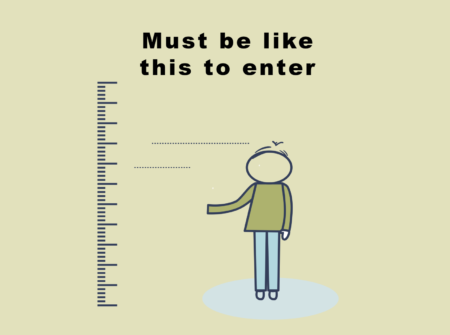Stop the Cultural Shaming
There’s a sentence that members of the minority communities on campus and elsewhere may have heard while growing up. Be it from a judgmental family member, a friend who perhaps meant well, or a stranger who has just met you, it always seems you come up: “But you’re not really like us because…” followed by a myriad of reasons why you aren’t enough.
It is an exhausting process, to have to constantly try to explain why you do belong in a group that you were born into. To some, no matter the effort that you put in to showcase how you are and have been existing in this community, the finish line will never be within reach.
Gatekeepers, people who demand that others meet certain criteria before allowing entrance, exist in every culture. In pop culture and sports fandoms, this comes across usually in a barrage of questions that are used to gauge the knowledge of an individual, with each subsequent question getting more difficult until you are deemed worthy or give up.
When it comes to the issue of identity and race, the arguments turn on its head and often there is no winning.
It no longer becomes about what you know, but rather who you are and what you have, and most importantly, have not experienced. This becomes an attack on a personal level that challenges you and the events that have made you, and they often come from members of our minority groups.
“This stressor originates within one’s own ethnic group,” states the Journal for Hispanic Higher Education in their 2012 research article “Too Latino and Not Latino Enough: The Role of Ethnicity-Related Stressors on Latino College Students’ Life Satisfaction.”
As members of marginalized groups, we need to support each other in the same struggle….
Carlos Holguin
“The perceived pressure to abide by one’s ethnic group member’s expectations about what is considered appropriate or inappropriate behavior for the group,” the article continues. “This includes both implicit and explicit reminders and in-group pressure to abide by cultural norms and expectations about attire, relationships, attitudes, and behavior.”
This kind of behavior isn’t just inherent to Latinx or ethnic groups, but seems to seep into minority groups like a slow poison. Individuals in the LGBTQ community have the rise of trans-exclusionary radical feminists, also known as TERFs, who claim that feminism should only be for cis-gendered individuals.
“Above all
As we continue to let others dictate who we are and tell our stories, we build barriers around our ideas and culture. We all have the ability to prevent the
As members of marginalized groups, we need to support each other in the same struggle because even if we don’t always have the same hurdles to jump, we are still trying to reach the same goal.



